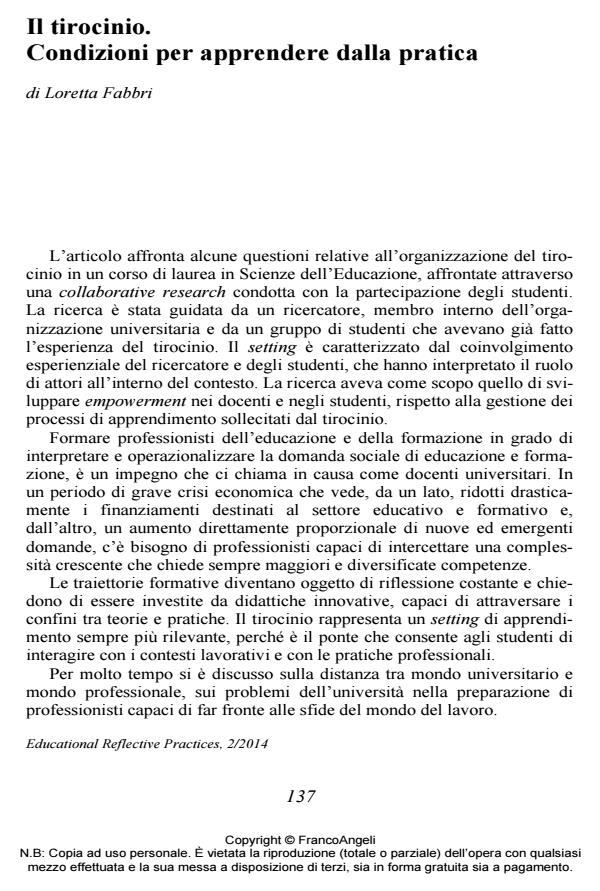Il tirocinio. Condizioni per apprendere dalla pratica
Titolo Rivista EDUCATIONAL REFLECTIVE PRACTICES
Autori/Curatori Loretta Fabbri
Anno di pubblicazione 2015 Fascicolo 2014/2 Lingua Italiano
Numero pagine 10 P. 137-146 Dimensione file 105 KB
DOI 10.3280/ERP2014-002009
Il DOI è il codice a barre della proprietà intellettuale: per saperne di più
clicca qui
Qui sotto puoi vedere in anteprima la prima pagina di questo articolo.
Se questo articolo ti interessa, lo puoi acquistare (e scaricare in formato pdf) seguendo le facili indicazioni per acquistare il download credit. Acquista Download Credits per scaricare questo Articolo in formato PDF

FrancoAngeli è membro della Publishers International Linking Association, Inc (PILA)associazione indipendente e non profit per facilitare (attraverso i servizi tecnologici implementati da CrossRef.org) l’accesso degli studiosi ai contenuti digitali nelle pubblicazioni professionali e scientifiche
The article analyzes some critical issues relating to the organization of internship in the formation of education professionals within the university courses. Education requires innovative teaching capable of crossing the boundaries between theory and practice. The internship is a learning setting increasingly important, because it is the bridge that allows students to interact with the workplace and professional practices. Listen to the students is a methodology of organizational development with which they can acquire important knowledge on the procedures with which to improve the activities of teaching/learning. The Author has proposed students to conduct qualitative research aimed to detect: - if and when what has been learned during the course of study was useful to manage the internship activities; - what students learn and what they do not learn during the internship experience; - what are the problems and the potential of that experience; - the proposals and suggestions that they wanted to do to the teachers and the institutions that received them. The article discusses the results of this research and, in general, we can say that the internship is identified as the area where the disciplines lose their ‘academic’ connotation and constitute the conceptual tools and patterns of intervention able to put in to know and understand the workplace.;
- Fabbri, L. (2007). Comunità di pratiche e apprendimento riflessivo. Per una formazione situata. Roma: Carocci.
- Fabbri, L., Melacarne C. (2015). Apprendere a scuola. Metodologie attive di sviluppo e dispositivi riflessivi. Milano: FrancoAngeli.
- Gherardi, S., Nicolini, D. (2004). Apprendimento e conoscenza nelle organizzazioni. Roma: Carocci.
- Mezirow, J. (2003). Apprendimento e trasformazione. Milano: Raffaello Cortina.
- Schön, D.A. (1993). Il professionista riflessivo. Bari: Edizioni Dedalo.
- Schön, D.A. (2006). Formare il professionista riflessivo. Per una nuova prospettiva della formazione e dell’apprendimento nelle professioni. Milano: FrancoAngeli.
- Striano, M. (2001). La ‘razionalità riflessiva’ nell’agire educativo. Napoli:
- Wenger, E. (2006). Comunità di pratica. Apprendimento, significato e identità. Milano: Raffaello Cortina.
- Wenger, E., McDermott, R., Snyder, W.M. (2007). Coltivare comunità di pratica. Prospettive ed esperienze di gestione della conoscenza. Guerini: Milano.
- Le soft skill nelle professioni sanitarie: è possibile insegnarle? Elena Bortolotti, Roberta Moro, in EDUCATIONAL REFLECTIVE PRACTICES 2/2019 pp.79
DOI: 10.3280/ERP2018-002006 - Il tutor esterno nei PCTO (Percorsi per le Competenze Trasversali e l'Orientamento): maestro invisibile alla ricerca di circolarità fra teoria e prassi Cinzia Zadra, in EXCELLENCE AND INNOVATION IN LEARNING AND TEACHING 1/2020 pp.29
DOI: 10.3280/exioa1-2020oa10075 - Progettare video immersivi per l’orientamento al lavoro: l’esperienza di Inside a working place Mario Giampaolo, Caterina Garofano, in IUL Research 1/2023
DOI: 10.57568/iulresearch.v4i7.456
Loretta Fabbri, Il tirocinio. Condizioni per apprendere dalla pratica in "EDUCATIONAL REFLECTIVE PRACTICES" 2/2014, pp 137-146, DOI: 10.3280/ERP2014-002009